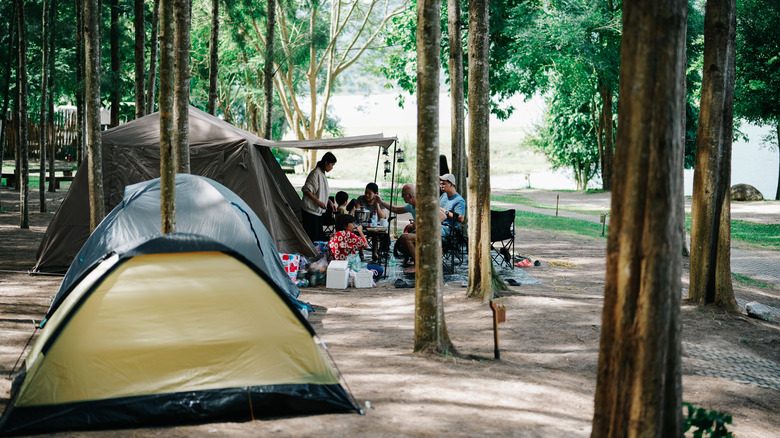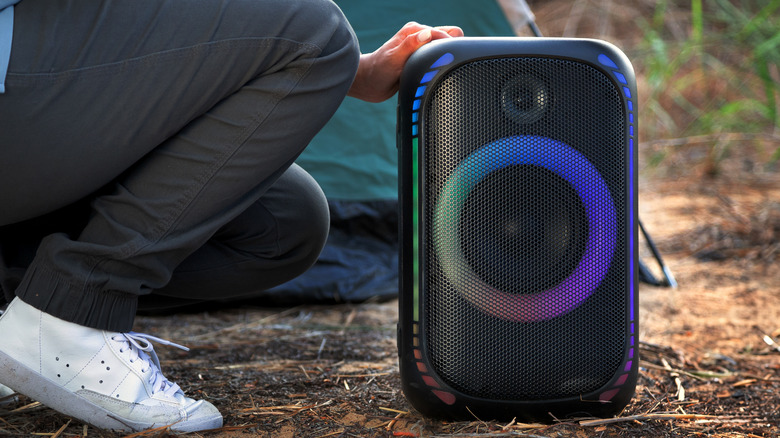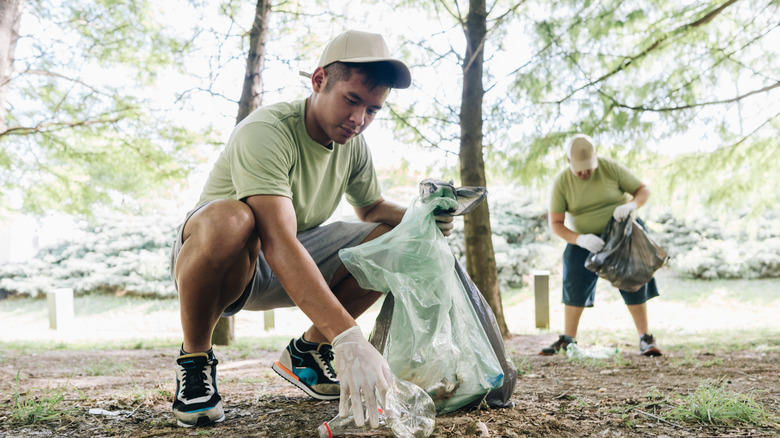Campground Etiquette Rules That Separate The Newbies From The Pros
Camping outdoors can mean being completely alone in nature at backcountry camping sites, or it could mean a crowded campsite with families and couples all over. Even if some campgrounds have larger, more private-feeling sites, you're still likely going to have neighbors. In some cases, the people around you can be annoying, rude, and even ruin your trip — and in others, your neighbors can transform your trip into a lifelong treasured memory with fascinating stories, delicious meals, and acts of unexpected kindness and generosity.
While you can't control what everyone else does, you can try to be a conscientious camper by following a few pro tips. These range from obvious ways to pitch in and help others to some insights that only come with experience. To find these tips, we consulted camping blogs, the r/camping subreddit, and Facebook groups to find valuable pro camper habits as well as what campers tend to complain about. In general, if you are respectful of your fellow campers, the land around you, and the wildlife that lives there, you will go from a camping newbie to a pro in no time.
Offer to help out other campers when you can
If you see a young couple puzzling over how to set up their tent, a group of friends struggling to start their campfire, or somebody fighting to shove their tent back into the tent bag (we have all been there) and you think you can lend a hand, you definitely should offer. Solo camping can be an unexpected cure for loneliness, and one reason for that is that it can be a great way to meet friends who love being out in nature as much as you do. Even if you're not looking for a new best friend, however, the nonprofit Families in Nature says it's good campground etiquette to offer help to people who are on their own or seem to be struggling. While some people like to be alone in nature and rely on themselves when they camp, packing up your campsite goes a lot faster with extra hands, and an offer of help is usually appreciated. The worst that can happen is they say no.
Obviously, if you're new to camping, you might not have much expertise to offer, but that doesn't mean you can't be a good neighbor. If you cooked yourself a great meal and ended up with enough to share, you can offer some to your fellow campers. Even if they don't want to try any, the offer will definitely be appreciated by any reasonable people in the campground. You don't have to be a great cook to share! Even if all you have is some extra s'mores, it's nice to offer.
Don't walk through other peoples' campsites without asking
Even if it's the middle of the night and the only thing standing between you and the bathroom is one other campsite, unless you want to make some enemies at your campground, you should definitely not cut through anybody else's campsite. To prevent this from happening, some people will put up clotheslines, coolers, and hammocks near the edges of their campground to block people from entering. In the r/camping subreddit, one user commented on the faux pas of cutting through others' campsites, saying, "I've been in some campgrounds where you have to cut through campsites to get to the toilets, but even then you stay on the edge of the other campsites."
This is a big breach of camping etiquette for a few reasons, but the main issue is privacy. While you might be very close to other families and groups when you use a campground, the expectation is that your campsite is your private space. People may be changing clothes, having campfire heart-to-hearts, trying to sleep, or just enjoying nature on their own, and they definitely will not appreciate having a random person wandering by their tent. At best, it's awkward, but it can also make people feel unsafe.
If you are in a situation where you have to go into someone else's campsite (for instance, if the campground is poorly laid out and there isn't a path to get where you need to go), just call out to them and ask for permission. You might think that it's less intrusive to just sneak by, but it's also a lot more alarming to look outside your tent and see a random stranger than have someone politely ask if they can come through.
Be mindful of how much noise you're making, especially at night
While you might have more fun watching a movie in your tent before bed or playing music while you cook, your neighbors at the next campsite might not agree. Users in the subreddit r/camping agreed that playing loud music is one of the most irritating things that campers do. One user wrote, "Most people don't get it. They would better fit in camping at a music festival, race track, or rodeo." If a podcast makes setting up your tent more fun, consider bringing your headphones. Even if it's not during official "quiet hours" at your campground, it's just the polite thing to do.
If you play an instrument and love singing campfire songs with your friends, the etiquette can be slightly different. While some people may still be frustrated to hear the sounds of other people rather than nature, live music is common at campfires. Some may even take it as an invitation to come join you at your campsite and enjoy the music. This is a controversial issue, even among frequent campers, so definitely only play before quiet hours. Be polite and try not to take it personally if someone comes over to ask you to keep it down. If you want to be extra conscientious, consider asking your neighbors if they're okay with it in advance.
The off-grid camping site Boondocker's Bible also warns that running a generator overnight falls into this "loud noise" category and might be considered rude. Even when you're technically allowed to run a generator overnight, the noise can be a major annoyance to those around you. So unless you have a machine you need to be running, be sure to power off the generator during quiet hours. If you have something that you really need power for overnight, consider getting a solar panel, battery, and inverter to power it.
Take care of your own trash
The last thing you want to see when you're trying to enjoy a relaxing camping retreat is garbage. Abandoned water bottles, paper plates, and pieces of broken camping equipment in common areas are a major eyesore and bad for the environment. It might seem like no big deal to leave something behind but ultimately, someone will have to clean it up. Leaving a mess for your fellow campers, the camp host, or park staff and volunteers is rude. One user in the r/camping subreddit said, "Whenever I go out I see trash so I keep bags with me and commit to picking up at least one bag on every camping trip. Please don't litter."
A good general rule is to leave your campsite better than you found it. If there are dumpsters in your campground, take the time to bring your garbage there. If there aren't dumpsters, pack your trash and throw it away at home. Don't try to burn any nonflammable trash, and be sure to dispose of it correctly.
This is especially important in bear country, where disposing of trash properly is an important step in bear-proofing your campsite. Not only could bears be a risk to your fellow campers, but teaching them that campgrounds are a good place to forage also puts the animal's life at risk. Even if you're not in bear country, it's still not a good idea to leave trash lying around — raccoons and mice might visit, too.
Consider keeping things dark
If you look though Reddit's r/camping, it's clear that a lot of people are interested in finding light sources for their campsites. It makes sense. A lot of people aren't used to being outside at night, far from the light of any urban centers. However, for stargazers, that's the main appeal of camping. Heading out into nature and looking up at the sky can be an incredible experience — but not if your neighbor has string lights on the whole time. Light pollution in the campground can ruin your view of the stars, make it tough to sleep, and lessen the joys of being out in nature.
Obviously, just because some people enjoy the dark doesn't mean that you can't have a campfire or use a flashlight to find your way around, but it's considerate to at least try to keep things from being too bright at night. Light Pollution News suggests that campers try to choose lights that only illuminate their own campsites, not everyone else's, and definitely turn off your lights before heading to sleep. If you must have floodlights or flashlights, always do your best not to point them at somebody else's tent.





